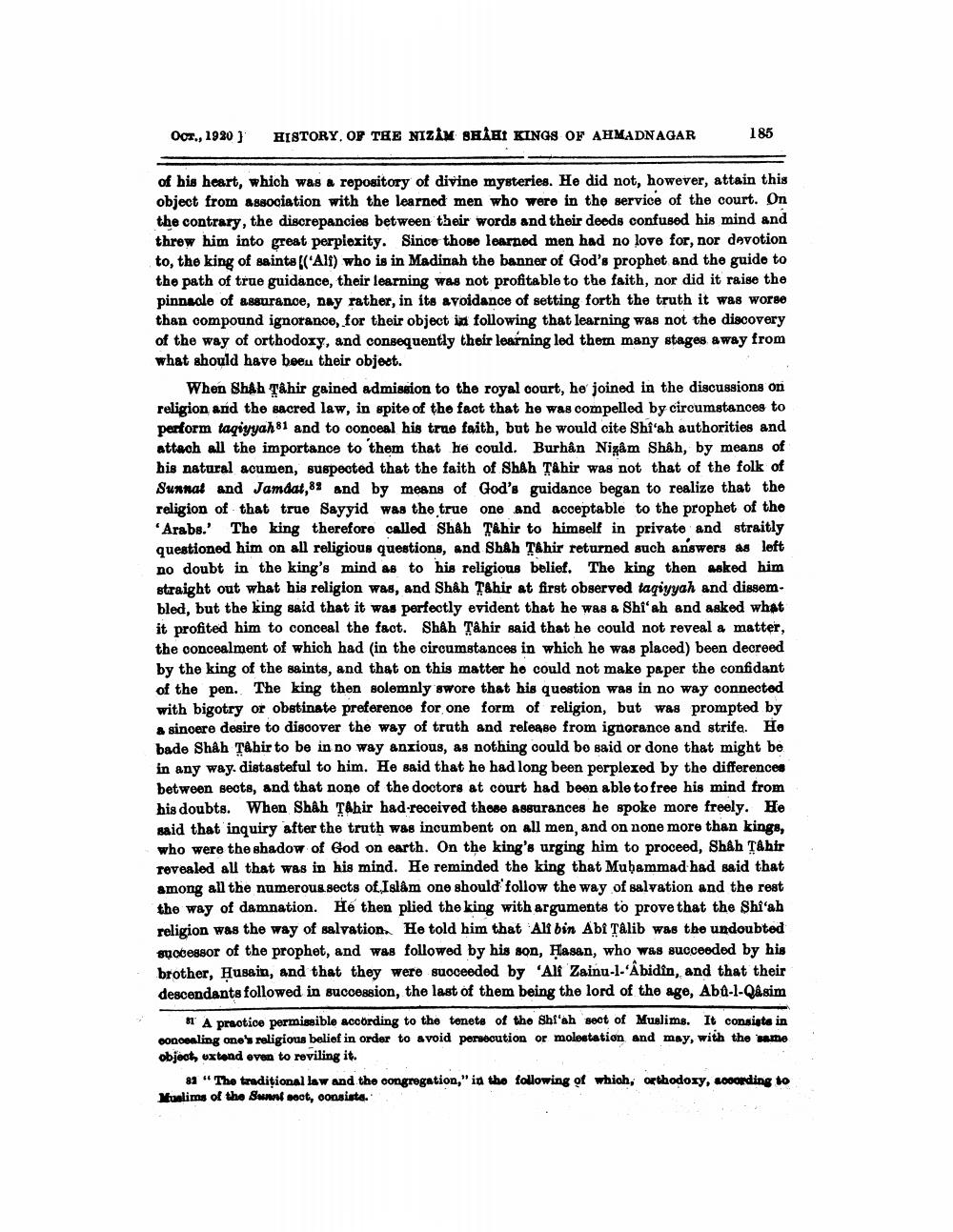________________
Ocr., 1920)
HISTORY OF THE NIZIN SHAH KINGS OF AHMADN AGAR
185
of his heart, which was a repository of divine mysteries. He did not, however, attain this object from association with the learnod men who were in the service of the court. On the contrary, the discrepancies between their words and their deeds confused his mind and threw him into great perplexity. Since those learned men had no love for, nor devotion to, the king of seinte ('Ali) who is in Madinah the banner of God's prophet and the guide to the path of true guidance, their learning was not profitable to the faith, nor did it raise the pinnacle of assurance, nay rather, in its avoidance of setting forth the truth it was worse than compound ignorance, for their object in following that learning was not the discovery of the way of orthodoxy, and consequently their learning led thern many stages away from what should have been their object.
When Shah Tâhir gained admission to the royal court, he joined in the discussions on religion and the sacred law, in spite of the fact that he was compelled by circumstances to perform taqiyyah 81 and to conceal his true faith, but he would cite Shi'ah authorities and attach all the importance to them that he could. Burhan Nigam Shah, by means of his natural acumen, suspected that the faith of Shah Tahir was not that of the folk of Sunnat and Jamaat, 82 and by means of God's guidance began to realize that the religion of that true Sayyid was the true one and acceptable to the prophet of the 'Arabs. The king therefore called Shah Tahir to himself in private and straitly questioned him on all religious questions, and Shah Tahir returned such answers as left no doubt in the king's mind as to his religious belief. The king then asked him straight out what his religion was, and Shah Tahir at first observed taqiyyah and dissembled, but the king said that it was perfectly evident that he was a Shi'ah and asked what it profited him to conceal the fact. Shâh Tahir said that he could not reveal a matter, the concealment of which had (in the circumstances in which he was placed) been decreed by the king of the saints, and that on this matter ho could not make paper the confidant of the pen. The king then solemnly swore that his question was in no way connected with bigotry or obstinate preference for one form of religion, but was prompted by & sinoere desire to discover the way of truth and release from ignorance and strife. He bade Shah Tahir to be in no way anxious, as nothing could be said or done that might be in any way. distasteful to him. He said that he had long been perplexed by the differences between sects, and that none of the doctors at court had been able to free his mind from his doubts. When Shah Tahir had received these assurances he spoke more freely. He said that inquiry after the truth was incumbent on all men, and on none more than kings, who were the shadow of God on earth. On the king's urging him to proceed, Shah Tahir revealed all that was in his mind. He reminded the king that Muhammad had said that among all the numerous.sects of Islam one should follow the way of salvation and the rest the way of damnation. He then plied the king with arguments to prove that the Shi'ah religion was the way of salvation. He told him that Ali bin Abi Talib was the undoubted Guccessor of the prophet, and was followed by his son, Hasan, who was succeeded by his brother, Husein, and that they were succeeded by 'Ali Zainu-l-'Abidin, and that their descendants followed in succession, the last of them being the lord of the age, Abu-l-Qasim
A practice permissible according to the tenets of the Shi'ah sect of Muslims. It consigta in concealing one's religious belief in order to avoid persecution or molestation and may, with the same object, extend even to reviling it.
81 "The traditional law and the congregation," in the following of which, orthodoxy, socording to Muslims of the Sunni soot, consista.




